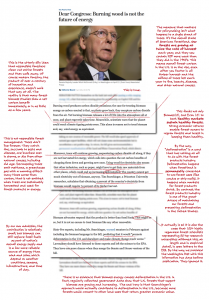Recently, the U.S. Senate passed the The Energy Policy Modernization Act that contains an amendment supporting the carbon benefits of biomass as a part of the country’s energy solution.
The tri-partisan amendment was presented by Sen. Susan Collins (R-ME), Sen. Amy Klobuchar (D-MN) and Sen. Angus King (I-ME) and received unanimous support by the senate earlier this year. The provision requires collaborative work between the Secretaries of Energy and Agriculture and the Administrator of the EPA to ensure that federal policy related to forest biomass, based on established science and expertise, is consistent across all departments and agencies.
The provision also seeks to warrant recognition of the benefits of forest biomass for energy, conservation and responsible forest management. The final Energy Policy Modernization Act passed the Senate 85-12.
“Forest owners commend Senators Collins, Klobuchar and King for their leadership in support of a clear and simple policy on biomass,” said Dave Tenny, president and CEO of the National Alliance of Forest Owners (NAFO). “Such a policy confirms the science on the carbon benefits of biomass and will encourage private investment, promote forest health and empower states to utilize biomass to reach their renewable energy goals.”
The amendment reflects the support of the 46 senators that encouraged the acceptance of a clear policy identifying the carbon benefits of forest biomass energy through a two-party letter to the Administration last June.
Washington Post Energy Editorial Gets it Wrong, Biomass 101 Responds
 On April 28, the Washington Post published an editorial focused on the Energy Policy Modernization Act scolding congress for supporting the use of wood for energy and citing several fallacies related to the carbon neutrality of forest biomass. Rather skillfully, Biomass 101, a campaign focused on promoting biomass and media accountability, proactively sent a letter to the Post’s editorial board and analyzed the flawed piece for accuracy.
On April 28, the Washington Post published an editorial focused on the Energy Policy Modernization Act scolding congress for supporting the use of wood for energy and citing several fallacies related to the carbon neutrality of forest biomass. Rather skillfully, Biomass 101, a campaign focused on promoting biomass and media accountability, proactively sent a letter to the Post’s editorial board and analyzed the flawed piece for accuracy.
The letter to the editorial board was co-signed by Robert Glowinski, President and CEO, American Wood Council; Donna Harman, President and CEO, American Forest & Paper Association; Deb Hawkinson, President, Forest Resources Association; David Tenny, President and CEO, National Alliance of Forest Owners.
Together the organizations focused on the reasoning behind the amendment to the Energy Policy Modernization Act, the scientific support for the carbon neutrality of forest biomass from group of 100+ forest scientists representing 80 top research universities, and the support of biomass from other governmental agencies, such as the EPA.
Nevertheless, the Post published the editorial, citing several fallacies related to the carbon neutrality of forest biomass, forest inventory in the U.S. and forest management practices in the U.S. Click here to view the Biomass 101 analysis of the editorial.
Why is Biomass Part of the Discussion?
The benefits of using biomass as an energy source are repeatedly recognized and supported by an abundance of studies, agencies, institutions, legislation and scientists throughout the world and play an important role in the future of America’s renewable energy.
Markets for biomass and other forest products stimulate ownership of forestland and enable landowners to maintain healthy, carbon-capturing forests. Data from the U.S. Government shows that the volume of growing trees in the United States has increased since 1953 by 50 percent and absorbs 13 percent of carbon emissions.
As an energy source, biomass can be used either directly through combustion to produce heat, or indirectly after the conversion to biofuel. The process is carbon neutral, not adding any extra carbon emissions into the atmosphere, and captures greenhouse gasses by tapping into the full carbon cycle. Current efforts for the use of biomass as energy are completed sustainably, allowing for more carbon to be stored by the trees than is released by the energy produced.

